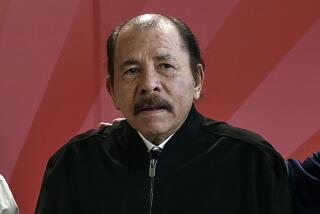U.S. Funding of the Contras
- Share via
So now Jeane Kirkpatrick parrots the Administration line that “today almost no one in Washington denies that Nicaragua has a Communist government . . . that it denies Nicaraguan citizens political and religious freedom,” etc.
Replying solely to the charge of oppression of religious freedom: If the charges are true, then why since 1983 have 2,300 Witness for Peace delegates, motivated by religious conviction, returned from that country after intensive two-week investigations, to report that religion there is alive and flourishing, in both Protestant and Catholic circles?
Then why, in the Directorate of the Nicaraguan government, are there included three prominent Catholic priests, all of whom continue as devout Catholic Christians?
Then why, in spite of some minor restrictions due to the war, is Archbishop Abando y Bravo, after coming to this country and openly calling for the overthrow of the Sandinista government, allowed to continue in his role, though prohibited from broadcasting over his nationwide radio network.
Then why do the hundreds of lay religious groups (called Base Christian Communities), who played so large a part in sparking the revolution in 1979, continue to give support and encouragement to the government in its efforts on behalf of the poor and the oppressed?
Then why, on the last night that our Witness for Peace delegation was in Managua, did many thousands of people come from all over the country for an all-night vigil to pray, as they put it, “that President Reagan might have a change of heart”?
Then why has the Baptist Convention in Nicaragua, representing one of the major evangelical denominations in that country, issued a strong endorsement of the government’s aims and objectives and harshly condemned our government for waging war on their country?
Then why, in the preamble to its newly ratified Constitution, is there an explicit recognition of God and of the place of religion?
Sadly, Kirkpatrick may be right in claiming that today “in Washington” there is no longer any doubt about “the character and commitments of the new Nicaraguan government,” so effective has been the Administration’s “disinformation” campaign.
In this, as in so many other facets of the Administration’s characterization about Nicaragua, there is just one problem: The facts simply belie the claims!
MELVIN E. SCHROER
Claremont
More to Read
Sign up for Essential California
The most important California stories and recommendations in your inbox every morning.
You may occasionally receive promotional content from the Los Angeles Times.












